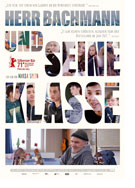

Opening 16 Sep 2021
Directed by:
Maria Speth
Writing credits:
Maria Speth, Reinhold Vorschneider
Just north of Frankfurt is a small town with a population of approximately 20,000 named Stadtallerdorf. Although this is a German town, it was about the same size as the town I grew up in, the exception being that we didn’t have refugees or an extraordinary teacher like Dieter Bachmann. He starts by asking his 6th grade students, aged twelve to fourteen, where do you feel at home? It is exactly a question I ask myself from time to time, so it didn’t surprise me when most of them answered that they feel closer to the land where they were born even though they may have come to Germany as a small child.
Dieter Bachmann is also inspiration since he approaches each student as an individual. Even if their language skills seem not up to par, he teaches them with respect and challenges them to strive to reach a higher level. I have rarely seen a teacher with such a vision of how to help under-privileged kids to not only succeed but also be curious about life. He not only accomplished that but also worked on integration and tolerance among those students who are coming from very diverse backgrounds by using music, crafts, and storytelling. He even personally revealed his own background and hardship which helped him build trust and give the students courage.
This warm-hearted documentary film was selected for Berlinale online program in March and then again in-person for the second half of the program in June. It was not a surprise that the film walked away with the first-ever Silver Bear Audience Award. 8,500 Berlin audience members voted for it from 15 movies. It was one of the most memorable films from the festival and can inspire us all to reach out and give a helping hand in making this world a better place. (Shelly Schoeneshoefer)
There is no telling how many hours German director Maria Speth spent in Herr Bachmann’s classroom, but it was enough to construct a lengthy one-year overview of the students and their progress. As well, an insider’s view of how this teacher reaches out to, and inspires 6th year students (approximately 11-12-year-old) in Stadtallendorf, Germany. There is a (small) number who are immigrants from Turkey, Bulgaria, Russia, etcetera, that as a whole struggle with comprehension while, and until, they learn German. In Germany’s complicated school system (that is different in every Bundesland/federal state), the 5th/6th class is an “orientation stage” whereby adolescents choose their life’s direction: Hauptschule (lower secondary school), Realschule (middle school) and Gymnasium (academic high school to prepare for university).
Dieter Bachmann is a fair teacher, going out of his way to help students, while pushing subjects he knows are important for their advancement. Class discussions are open and about their feelings for/against foreigners, racism, and expectations; Bachmann educates students about taking responsibility for what they say. For example, an immigrant and a local’s exchange regarding how different it is for students that grew up in Germany, as opposed to being much harder for immigrant students, e.g., simultaneously learning two languages (German, and then English). A corner of the classroom is devoted to musical instruments; pupils’ practicing/performing together builds teamwork, confidence, and camaraderie. Tests are well monitored; parent-teacher meetings sometimes include an interpreter. Christmas decorations come and go, winter clothes give way to lightweight attire as the students change before our eyes. Until, it is time for the end-of-year class trip, and then clearing out the classroom.
There is so much to observe, learn, and enjoy in Herr Bachmann’s classroom, it is puzzling why co-writers Speth and Reinhold Vorschneider wandered away to two other teachers’ classrooms, leaving viewers frustratingly uninformed. That choice muddled the context, thereby the film’s natural rhythm is lost. Another thing that grates is its amateurish execution: Maria Speth’s editing is patchy, and, the abrupt transitions with uneven B-roll material compounds the documentary’s incoherence and confusion. Considering it is over 3-hours long (217 minutes), a more discerning storyline, plus having someone not in love with the footage edit could have done wonders for this art-house film. You might want to wait for the DVD, so you too can wander away during dull bits. (Marinell Haegelin)